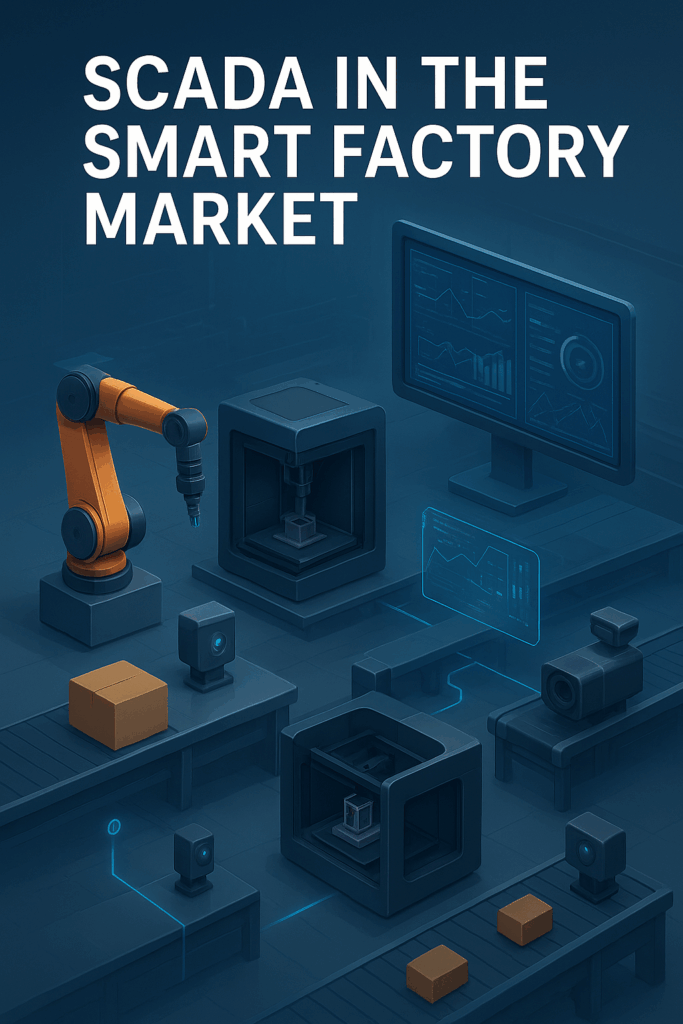SCADA in the Smart Factory Market
Supervisory Control and Data Acquisition also known as SCADA plays a central role in the transformation of traditional manufacturing into smart factories. In an era where automation artificial intelligence and the Industrial Internet of Things are reshaping industries SCADA is the backbone that connects machines sensors and systems into a unified operational framework. By enabling real time monitoring process control and data driven decision making SCADA is helping factories improve efficiency ensure safety and optimize resource utilization. In the smart factory market SCADA is not only used for monitoring but also for predictive maintenance process optimization and seamless integration across distributed production units. Its ability to handle massive volumes of data while providing visibility and control at both the plant and enterprise levels makes it indispensable for modern manufacturing.

Key Roles of SCADA in Smart Factories
- Centralized Monitoring and Control
SCADA provides a centralized platform where operators can monitor all critical assets processes and equipment in real time. This eliminates the need for manual checks and ensures that any issue can be identified and addressed instantly. - Integration with Industrial Internet of Things
Smart factories rely on sensors and connected devices that generate large amounts of data. SCADA systems act as integrators combining IoT data streams with process control systems to deliver actionable insights for decision makers. - Real Time Data Acquisition
SCADA continuously collects data from machines sensors and devices ensuring that plant managers have access to accurate up to the minute information about energy consumption equipment status and production performance. - Enhanced Decision Making
With advanced visualization tools dashboards and analytics SCADA empowers operators to make informed decisions. Trends anomalies and inefficiencies can be quickly identified leading to better resource allocation and improved productivity. - Predictive Maintenance Support
Through integration with smart sensors SCADA helps identify potential equipment failures before they occur. Predictive alerts minimize downtime reduce maintenance costs and extend the life of machinery. - Industrial Safety and Compliance
SCADA is crucial in ensuring safety within a factory by monitoring hazardous conditions such as gas leaks temperature surges or pressure fluctuations. It also helps companies comply with regulatory standards by maintaining accurate logs and reports. - Remote Accessibility
Modern SCADA systems are designed with secure remote access allowing engineers and plant managers to monitor and control operations from anywhere. This feature increases flexibility and responsiveness in managing smart factories. - Energy Efficiency and Sustainability
By providing detailed insights into energy usage SCADA helps manufacturers optimize consumption patterns reduce waste and adopt greener practices. This is vital in meeting sustainability goals and reducing operational costs. - Scalability for Large Operations
Smart factories often expand across multiple sites and geographies. SCADA systems are scalable allowing companies to integrate new machines sensors and production units without disruption. - Cybersecurity Features
As connectivity grows cybersecurity becomes critical. Modern SCADA platforms are designed with advanced encryption and multi layer security features to protect factory systems against cyber threats. - Improved Human Machine Collaboration
SCADA interfaces enable seamless communication between human operators and automated systems. Intuitive dashboards reduce complexity and ensure that workers can focus on problem solving and innovation rather than repetitive monitoring tasks. - Data Driven Innovation
The vast amount of data collected by SCADA systems becomes a foundation for innovation. By applying machine learning and artificial intelligence to SCADA data companies can develop smarter production strategies and create new business models. - Support for Customization and Flexibility
Every factory has unique requirements. SCADA solutions can be customized to adapt to specific industry needs whether in automotive electronics food processing or heavy manufacturing. This flexibility makes SCADA highly valuable across sectors. - Cost Optimization
The ability to detect inefficiencies predict failures and optimize resource allocation directly translates into cost savings. SCADA ensures that factories can maintain competitiveness in a rapidly evolving global market. - Market Growth Drivers
The rising demand for industrial automation increasing adoption of Industry 4.0 and growing emphasis on energy efficiency are major factors driving the SCADA segment in the smart factory market. Companies are investing in SCADA as part of their digital transformation journey. - Challenges in Implementation
Despite its benefits challenges such as high initial costs integration complexity and the need for skilled professionals can slow adoption. However advancements in cloud based SCADA and user friendly interfaces are gradually overcoming these barriers. - Future Outlook
The future of SCADA in smart factories lies in deeper integration with artificial intelligence edge computing and digital twins. These technologies will enhance SCADA’s predictive capabilities resilience and adaptability to dynamic manufacturing environments.
